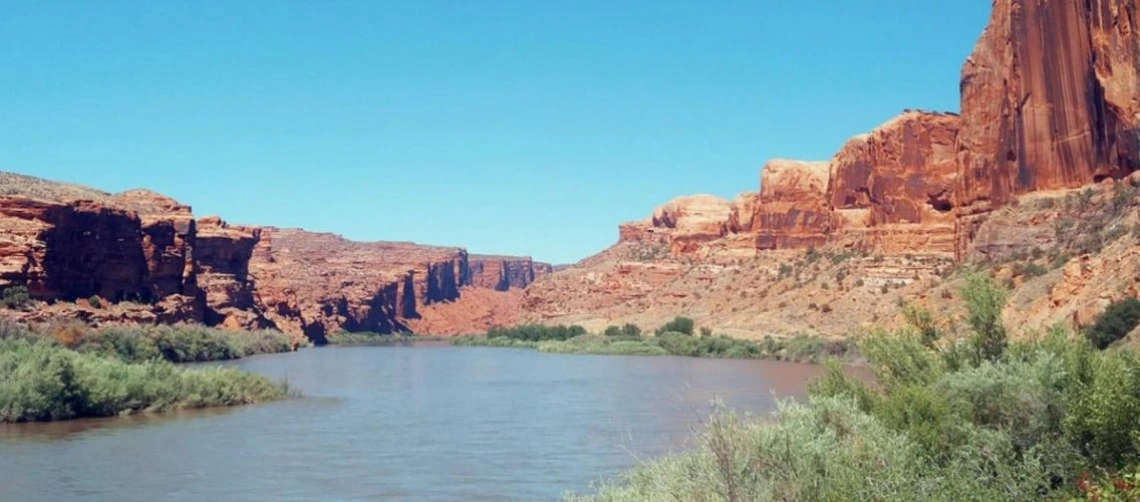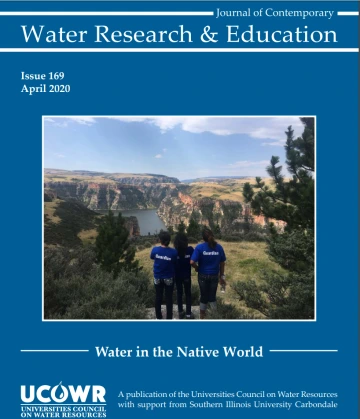Water in the Native World: an Indigenous-led special issue focusing on water research in Indigenous Communities

“Water in the Native World,” a special issue on tribal water research was just released by the Journal of Contemporary Water Research and Education. This is the second time, Dr. Karletta Chief, the PI of the Community Engagement Core (CEC) of the University of Arizona Superfund Research Center (UA SRC) has served as a guest editor to compile research highlighting important water research in tribal communities. Not only is the guest editor Indigenous but in this Special Issue nearly all of the co-authors are Indigenous and three publications (Bulltail and Walter, 2020; Conroy-Ben and Crowder, 2020, and Martin et al., 2020) are led by an Indigenous lead author.

To Indigenous peoples, water is sacred. Water is the lifeline of Indigenous cultures, ceremonies, livelihood and beliefs. Indigenous peoples have a repository of knowledge related to water, its use, and its spatial and temporal distribution. Hydrology and water resources can greatly benefit from Indigenous perspectives that includes place-based knowledge that helps us better understand complex natural and human systems (Karletta Chief, 2020). “Water in the Native World” provides several examples of mining impacts on tribal waters including uranium mining on the Navajo Nation and coal mining on the Crow Tribe and Hopi Tribe. The first paper in “Water in the Native World” is entitled “A confluence of anticolonial pathways for Indigenous sacred site protection” by Ellis and Perry (2020). Ellis and Perry (2020) discuss the challenges facing the Hopi Tribe in advocating for the protection of a sacred site, Sipapuni, in the western paradigms of water rights litigation and cultural resource management, particularly alongside the legacies of coal mining. In addition, Jones, Credo, Parnell, et al. (2020) and Jones, Credo, Ingram, et al. (2020) focus on Arizona and provide results on arsenic and uranium contaminants in water and its impact on tribal communities. Jones, Credo, Parnell, et al. (2020) published “Dissolved uranium and arsenic in unregulated groundwater sources-Western Navajo Nation.” Since 2003, they have sampled 82 unregulated wells on the western side of the Navajo Nation and tested for uranium and arsenic. The third paper entitled “Arsenic concentrations in ground and surface waters across Arizona including Native lands” by Jones, Credo, Ingram, et al. (2020) compiled online water quality databases to understand visually arsenic concentrations in groundwater and surface water sources in Arizona, resulting in 33,000 water samples collected from 1990-2017. The fifth paper by Bulltail and Walter (2020) focuses on investigating the impact of coal mining on surface water quality on and around the Crow Reservation. Their paper is entitled “Impacts of coal resource development on surface water quality in a multi-jurisdictional watershed in the western United States.”
This Special Issue aims to bring to the forefront and address water challenges facing Indigenous communities in research led by Indigenous hydroscientists, where Indigenous perspectives are not only included in the research but also drive the research questions; where Indigenous community members are co-authors; and where Indigenous students participate in data collection, analysis, synthesis and publication in the important research facing their communities.
The UA SRC CEC hosted a webinar series highlighting the "Water in the Native World" Special Issue:
- June 11, 2020 at 2 PM MST - "A Confluence of Anticolonial Pathways for Indigenous Sacred Site Protection"
Speakers: Danielle Perry and Rachel Ellis (Listen to Recording)
- June 17, 2020 at 2 PM MST - "Dissolved Uranium and Arsenic in Unregulated Groundwater Sources – Western Navajo Nation"
Speakers: Lindsey Jones and Jani Ingram (Listen to Recording)
- June 24, 2020 at 2 PM MST - "Arsenic Concentrations in Ground and Surface Waters across Arizona Including Native Lands"
Speakers: Catherine Propper and Marie Jones (Listen to Recording)
- July 1, 2020 at 2 PM MST - "Walleye Ogaawag Spearing in the Portage Waterway, Michigan: Integrating Mixed Methodology for Insight on an Important Tribal Fishery". Speaker: Andrew Kozich (Listen to Recording)
- July 8, 2020 at 2 PM MST - "Change Rippling through Our Waters and Culture"
Speaker: Christine Martin (Listen to Recording)
- July 15, 2020 at 2 PM MST - "Unregulated and Emerging Contaminants in Tribal Water"
Speaker: Dr. Otakuye Conroy-Ben (Listen to Recording)
View this Special Issue online at: https://ucowr.org/journal/current-issue/
Download the full PDF at: http://ucowr.org/wp-content/uploads/2020/05/JCWRE_169_Full_Issue.pdf
Details of more talks from this series can be found here: https://extension.arizona.edu/water-native-world-webinar-series

